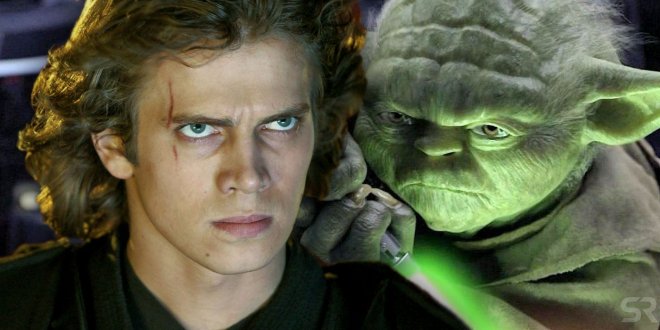
During the period of the Star Wars prequel trilogy, the Jedi Order became concerned about Anakin Skywalker's temperament, although Grand Master Yoda quietly believed there was something positive to be found within it. Though his training began years later than a Jedi’s typically should, Anakin’s mastery of the Force grew beyond what any in the Jedi High Council could have imagined. He was, however, spontaneous, reckless, and unpredictable, often going against the advice of the Jedi to do as he pleased in the moment. It turned him into a controversial figure among the Council members, although Yoda remained intrigued.
Yoda knew as well as anyone by the time of the Clone Wars that Anakin had the potential to one day become the Grand Master of the Jedi Order, the seat that Yoda himself currently held. Anakin’s behavior during the Clone Wars was positive and inspiring. He single-handedly led the Republic through some of its darkest days, and it was impossible to deny that he was a phenomenal combat general. He was the poster boy for the Jedi and not without good reason: he rescued Master Piell, prevented the destruction of Anaxes, and he trained Ahsoka – among other things.
Yoda Believed Anakin's Spontaneity Was His True Gift  However, what Yoda was most impressed by was not Anakin’s unmatched Force abilities, nor his proficiency with a lightsaber. Curiously enough, Yoda began observing the aforementioned spontaneity and occasional recklessness that Anakin had, which he believed to be his true gift. In the sixth season of Star Wars: The Clone Wars, Yoda enlisted Anakin to help him escape from his guards to travel to Dagobah. Even away from the war, Yoda saw that Anakin was a valuable asset whose unorthodox methods might help the Jedi get the upper hand. Though Anakin was undeniably something of a loose cannon, his unique temperament gave the Jedi something they hadn’t already: a new trick.
However, what Yoda was most impressed by was not Anakin’s unmatched Force abilities, nor his proficiency with a lightsaber. Curiously enough, Yoda began observing the aforementioned spontaneity and occasional recklessness that Anakin had, which he believed to be his true gift. In the sixth season of Star Wars: The Clone Wars, Yoda enlisted Anakin to help him escape from his guards to travel to Dagobah. Even away from the war, Yoda saw that Anakin was a valuable asset whose unorthodox methods might help the Jedi get the upper hand. Though Anakin was undeniably something of a loose cannon, his unique temperament gave the Jedi something they hadn’t already: a new trick.
Indeed, when Anakin exhibited behaviors deemed unbecoming for Jedi (usually in moments of frustration or fear), Yoda did become worried. The Jedi were utterly consumed with their ancient dogma by the time of the prequel trilogy, which led to their fearing controversial figures. In the Clone Wars, however, Yoda saw that the noble acts of negotiating and peacekeeping were more or less futile. What the Jedi needed were warriors, and Yoda knew that a Jedi’s impulses were vital in battle, so Anakin’s spontaneity suddenly became something to nurture and guide in the right direction, rather than crush.






